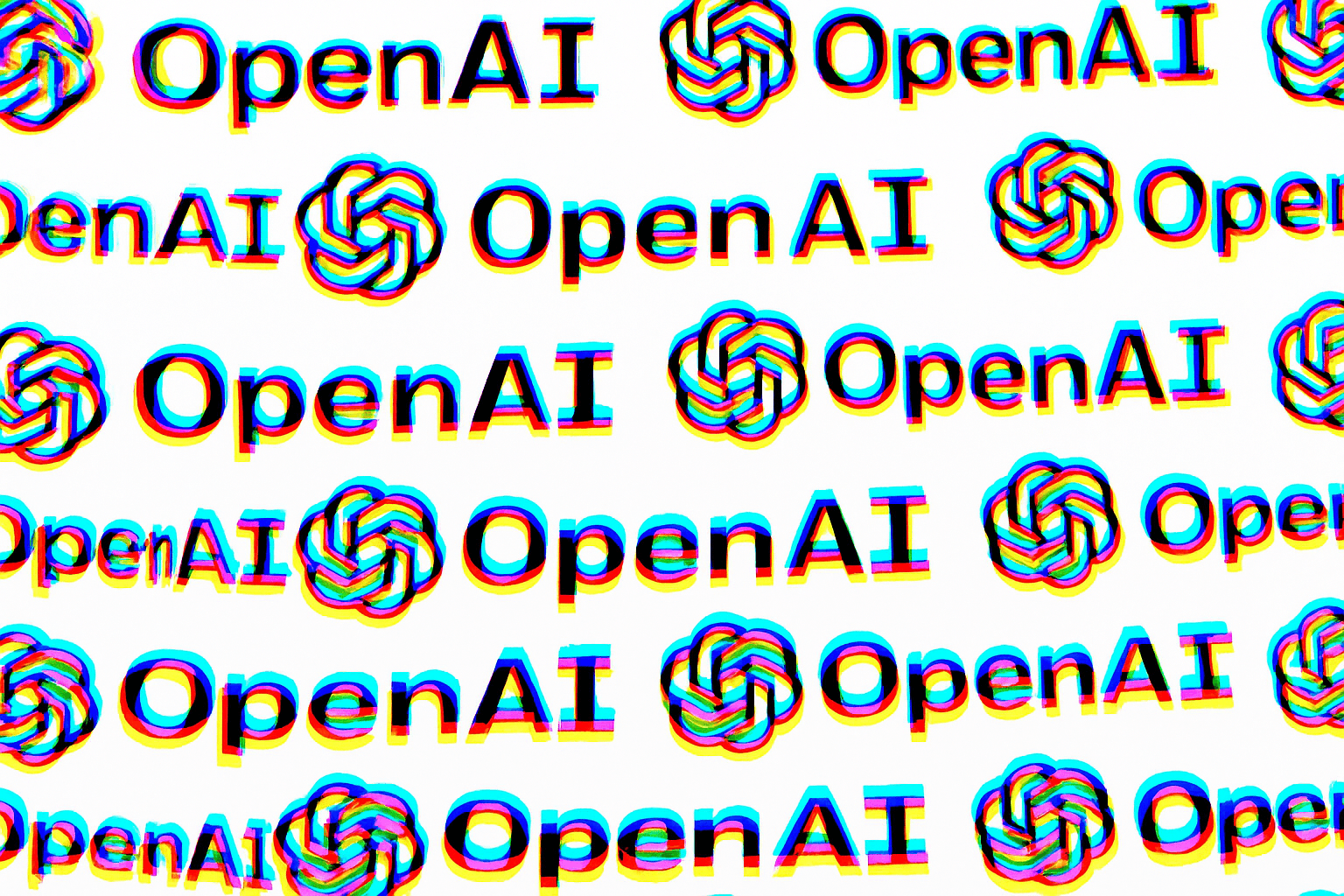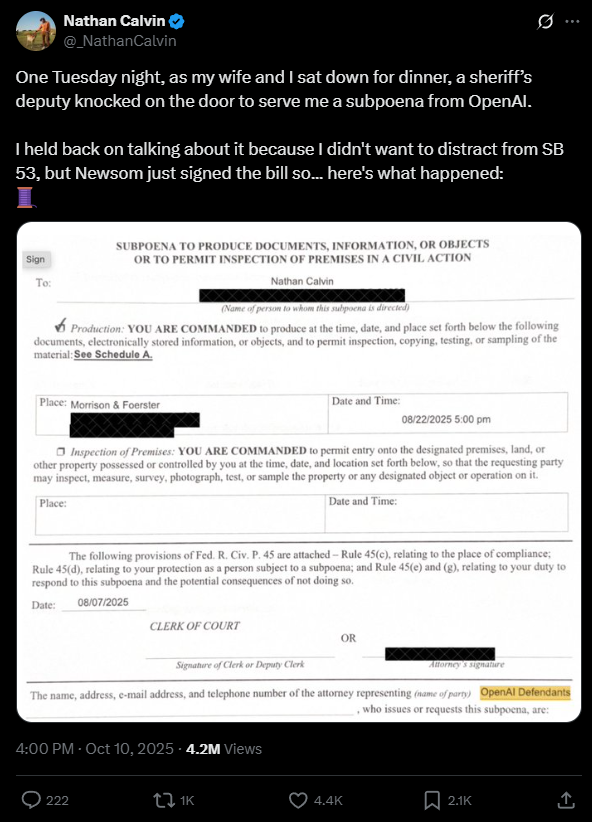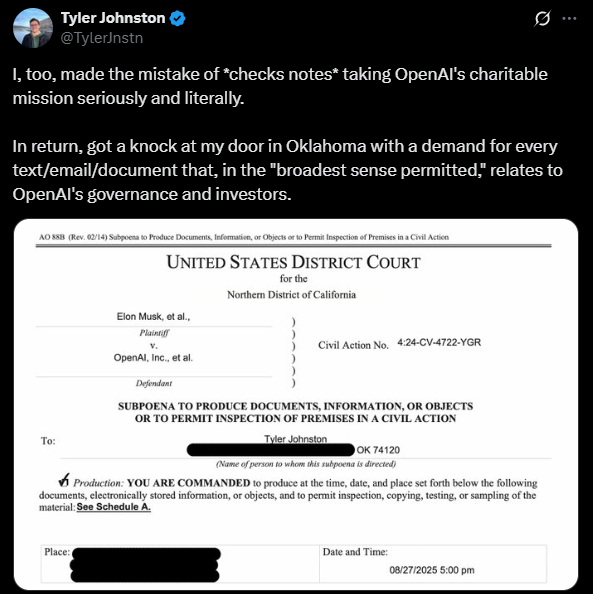OpenAI accused of pressuring AI regulation advocates with subpoenas

Reports have surfaced that OpenAI served subpoenas to civil society groups and individuals pushing for stricter AI regulations, including key supporters behind California's new AI law, SB 53.
Nathan Calvin, an attorney with Encode, says he was served a subpoena at home by a sheriff acting for OpenAI. Encode had criticized OpenAI's restructuring and supported California's new AI transparency law, SB 53.
Calvin says OpenAI demanded his communications with California lawmakers, students, and former OpenAI employees about SB 53. He calls it an intimidation tactic: "I believe OpenAI used the pretext of their lawsuit against Elon Musk to intimidate their critics and imply that Elon is behind all of them," he wrote on X.

Encode had publicly criticized OpenAI's for-profit plans and helped draft SB 53. OpenAI tried to link Encode to Elon Musk—a claim Calvin rejects: "Elon isn’t involved with Encode. Elon wasn’t behind SB 53. He doesn’t fund us, and we’ve never spoken to him." The subpoena also asked about Encode's financial backers and any contact with Musk.
Calvin also alleges OpenAI sent a letter to Governor Newsom seeking to "gut" SB 53 by removing all requirements for companies working with the federal government on AI evaluation.
OpenAI says subpoenas tied to Musk lawsuit
Jason Kwon, OpenAI's Chief Strategy Officer, denied the allegations. He said the subpoenas are part of evidence preservation in OpenAI's ongoing legal dispute with Elon Musk. Encode, according to Kwon, had sided with Musk early on and became part of the broader legal case. The subpoenas aimed to uncover potential conflicts of interest or ties to competitors.
Kwon said this is not a separate lawsuit against Encode or Calvin, and that serving subpoenas via sheriff is standard procedure. He also said OpenAI did not oppose SB 53, but only submitted "comments for harmonization with other standards."
OpenAI's legal strategy appears to be based on the idea that large competitors may have backed or coordinated with these advocacy groups.
The Midas Project receives similar subpoena
Tyler Johnston, founder of The Midas Project, says his organization received a nearly identical subpoena. OpenAI demanded all communications with journalists, lawmakers, former OpenAI employees, and other advocacy groups.
"As with Nathan, had they just asked if I'm funded by Musk, I would have been happy to give them a simple "man I wish" and call it a day," Johnston wrote on X.

Johnston believes the timing relates to upcoming decisions by California and Delaware regulators on OpenAI's planned shift to a for-profit structure, which could value the company at up to $500 billion. The Midas Project had raised concerns about the restructuring in an open letter.
"Maybe they wanted to map out who they needed to buy off. Maybe they just wanted to bury us in paperwork in the critical weeks before the CA and DE attorneys general decide whether to approve their transition from a public charity to a $500 billion for-profit enterprise," Johnston wrote.
There is some pushback from within OpenAI. Joshua Achiam, Head of Mission Alignment, publicly questioned the company's tactics: "At what is possibly a risk to my whole career I will say: this doesn't seem great."
Achiam says OpenAI has a legitimate reason to participate in AI regulation, and adds, "Elon is certainly out to get us and the man has got an extensive reach."
But he argues the company should avoid tactics "that make us into a frightening power instead of a virtuous one." He warns that abuse of power "is the result of many small choices that are all borderline but get no pushback," and sees his own objection as necessary dissent.
Achiam also references a previous crisis at OpenAI over confidentiality agreements, warning against losing public trust again. "We have a duty to and a mission for all of humanity. The bar to pursue that duty is remarkably high," he wrote.
AI News Without the Hype – Curated by Humans
As a THE DECODER subscriber, you get ad-free reading, our weekly AI newsletter, the exclusive "AI Radar" Frontier Report 6× per year, access to comments, and our complete archive.
Subscribe nowAI news without the hype
Curated by humans.
- Over 20 percent launch discount.
- Read without distractions – no Google ads.
- Access to comments and community discussions.
- Weekly AI newsletter.
- 6 times a year: “AI Radar” – deep dives on key AI topics.
- Up to 25 % off on KI Pro online events.
- Access to our full ten-year archive.
- Get the latest AI news from The Decoder.